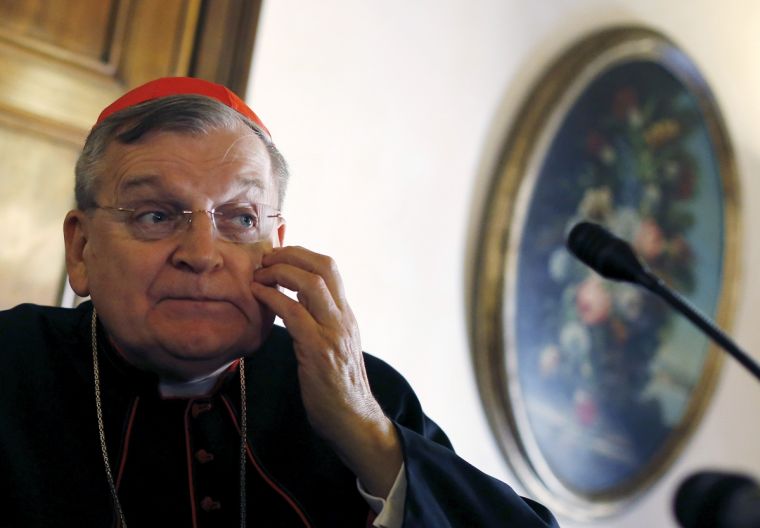Is The Pope A Heretic?
Cardinal Raymond Burke has threatened to make a "formal act of correction" to Pope Francis' teaching in a highly controversial and unusual public spat.
The ultra-conservative critic of the Argentine pontiff insisted there was a tradition of cardinals challenging the Pope if he is in error. Making "a formal act of correction" is the first step to declaring someone a formal heretic.
It comes as a feud between conservative leaders including Burke and Francis reached fever pitch within the Catholic Church.

What lies behind the argument?
The row centres on one sentence, in one footnote in Pope Francis' recent Amoris Laetitia document, released after two synods on the family in 2014 and 2015.
In it the Pope writes a person "in an objective situation of sin can love and can also grow in the life of grace and charity, while receiving the Church's help to this end". It calls for "discernment" and a footnote adds: "In certain cases, this can include the help of the sacraments."
Although it does not directly address divorced and remarried Catholics, this line was widely seen as giving local bishops and priests the final say in whether to allow remarried divorcees to receive Holy Communion.
The document as a whole makes a general call for discernment saying it is not "enough simply to apply moral laws to those living in "irregular" situations, as if they were stones to throw at people's lives". It adds: "Neither the Synod nor this Exhortation could be expected to provide a new set of general rules, canonical in nature and applicable to all cases. What is possible is simply a renewed encouragement to undertake a responsible personal and pastoral discernment of particular cases."
According to one Catholic commentator and former Master of the Dominican Order, Father Timothy Radcliffe, Pope Francis is "systematically undoing" the Church's "desire to dominate and to rule".
On top of this a leaked letter the pontiff wrote to the Archbishop of Buenos Aires appears to indicate Pope Francis personally supports Communion for the remarried.
Why is this controversial?
Firstly, strict Catholic teaching has been seen as prohibiting communion for divorced and remarried Catholics essentially because it is seen as adulterous.
In an interview with a French TV station in February 2015 Burke said: "I cannot accept that Communion can be given to a person in an irregular union because it is adultery." Asked what would would happen if Francis pressed ahead with the changes he said: "I shall resist, I can do nothing else."
But more than that for Burke and his conservative colleagues Amoris Laetitia creates a "confusion" and undoes the security of clear papal teaching.
An emphasis on "personal and pastoral discernment" among local priests and bishops seems dangerous to those who would prefer the comfort of a top down dictate.
What did they ask Pope Francis?
Four Cardinals – Raymond Burke, Carlo Caffarra, Walter Brandmüller and Joachim Meisne – asked the Pope to clarify his teaching in September.
Their letter was in the form of asking theological "dubia" – a set of questions to the pontiff that require a yes or no ruling on matters of doctrine. They say Amoris Laetitia has caused "grave disorientation and great confusion" among the faithful.
The questions essentially box Francis in by asking whether previous Catholic dictates still stand if they appear to ban the giving of communion to divorcees. In answering the Pope would be required to restate old rules which he does not want to do. You can read the questions in full here.
So he acknowledged their letter but has not replied.
So where are we now?
Well Burke is living up to his promise and is resisting.
His threat to make a formal act of correction is extraordinary and hyperbolic but given his tract record of rebellion would not be out of character. If he does take that first step to declaring the pope a heretic the Church would be in unprecedented situation.
It is possible Burke and Francis' positions can be reconciled without either having to rescind but it is unlikely to happen unless the pontiff issue a public reply to Cardinal Burke. Until that happens, the row continues to simmer.











